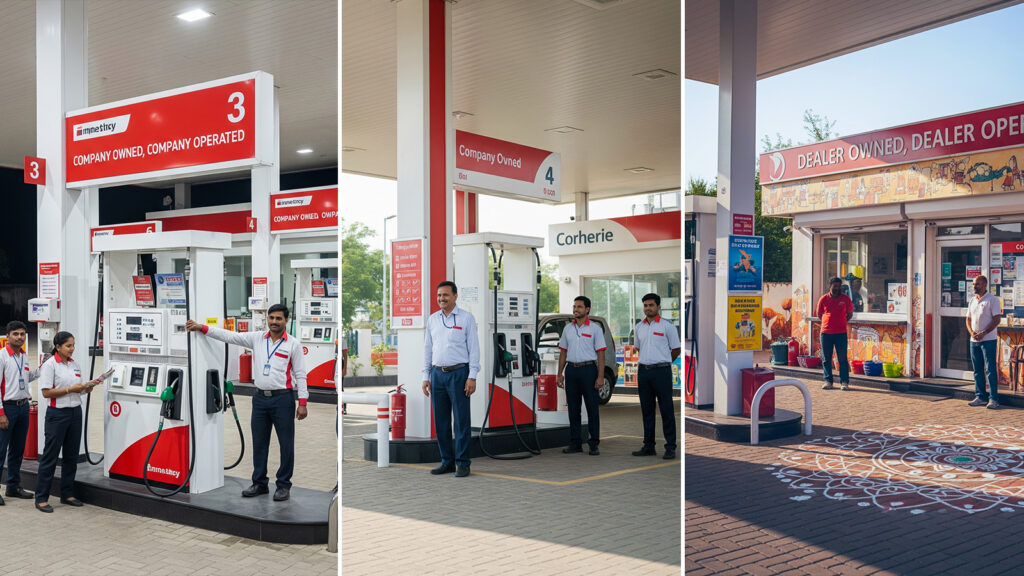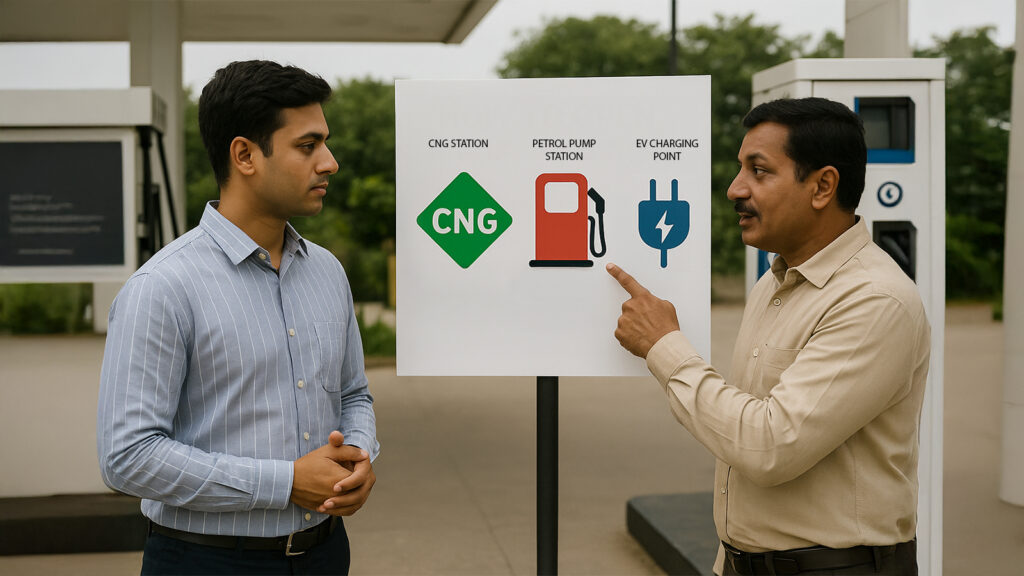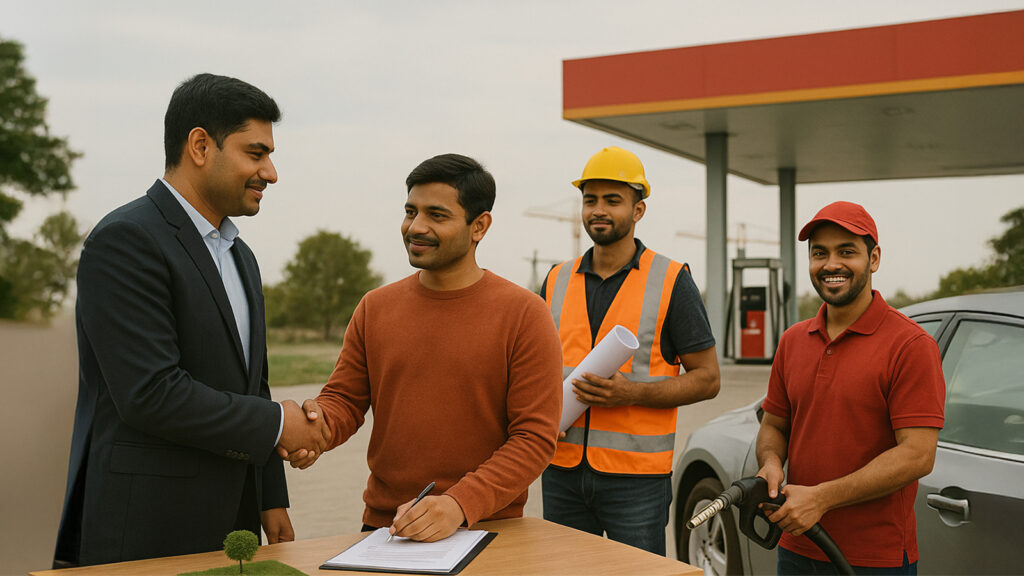Amarba Blog 3
COCO vs. CODO vs. DODO: Which Model Is Right for You? Opening a fuel station can feel like a big step. There are three main ways to do this. They are called COCO, CODO, and DODO. Each model has its own rules and benefits. By the end, you will know which model might work best for you. Let’s start! 01 What Do These Letters Mean? COCO stands for Company Owned, Company Operated. CODO means Company Owned, Dealer Operated. DODO is Dealer Owned, Dealer Operated. These letters show who owns the land and who runs the station. “Company” means a big oil brand like Indian Oil, BPCL, or HPCL. “Dealer” means you, the person who wants to open the station. In COCO, the oil company owns and runs the station. In CODO, the oil company owns the land and pumps, but you run the station. In DODO, you own everything and run everything. 02 COCO Model: Company Owned, Company Operated 2.1. What Is COCO? In the COCO model, the big oil company does almost everything. They buy or rent the land. They build the station. They also hire staff to run day-to-day work. You do not own the station. Instead, you can work for the company as a manager or contractor. 2.2. How It Works The company picks and buys the land. They built the station with pumps, tanks, and a small shop. They hire people to fill fuel, handle payments, and clean the station. You can apply to become a manager or a contractor. You follow their rules and training to manage daily tasks. 2.3. Pros of COCO Low Investment Risk: You do not pay for land or pumps. Stable Salary: As a manager or contractor, you get a fixed income. Training Provided: The company trains you on safety and customer service. Brand Trust: You work under a well-known oil brand. Customers trust the fuel quality. 2.4. Cons of COCO No Ownership: You do not own the station or its profits. Less Control: You follow company rules, not your ideas. Limited Income Growth: Your salary or fee is fixed by the company. Job Dependence: If the company moves you or closes the station, your job ends. 2.5. Who Should Choose COCO? You have little money to invest. You want stable work and a guaranteed salary. You prefer working under a big brand rather than running your own business. You like to learn station operations without the risk of ownership. 03 CODO Model: Company Owned, Dealer Operated 3.1. What Is CODO? In the CODO model, the oil company still owns the land and pumps. But you, as the dealer, run the station every day. You pay a fee to the company for this right. You handle staff, customer service, and daily sales. You earn a profit by selling fuel and other items. 3.2. How It Works You apply to the oil company for a dealership. If approved, you will sign a contract. The company owns the land and equipment. You pay a one-time fee and a deposit for working capital. You hire staff to operate pumps, handle payments, and keep the station clean. You manage day-to-day operations, order fuel, and handle cash. The company supplies fuel at agreed prices and maintains major equipment. 3.3. Pros of CODO Lower Initial Investment: You do not buy land or heavy equipment. Profit Share: You keep most of the profit from fuel sales and convenience store items. Brand Support: You get marketing, fuel supply, and quality checks from the company. Operational Control: You decide staffing, customer service style, and local promotions. 3.4. Cons of CODO Dealer Fees: You must pay an initial fee and a capital deposit. Profit Cuts: You share some profit or margins with the oil company. Contract Terms: You must follow company rules and targets. Limited Asset Growth: You do not own the station’s land or pumps, so you cannot sell them. 3.5. Who Should Choose CODO? You have moderate savings and can pay dealer fees. You want to run the station and earn profits, but do not want heavy risk. You like the brand backing of a big oil company but want some control over operations. You plan to grow your profits through good management and customer service. 04 DODO Model: Dealer Owned, Dealer Operated 4.1. What Is DODO? In the DODO model, you, as the dealer, own everything. You buy or lease the land yourself. You buy pumps, tanks, and safety equipment. You run the station from day one. This model gives you the most control and profit, but also the most responsibility and risk. 4.2. How It Works You find and buy or lease the land on your own. You apply to the oil company for a dealer license. You sign a contract that lets you sell their fuel under their brand. You build the station with pumps, tanks, a canopy, and a shop area. You buy all the equipment: fuel dispensers, payment machines, and safety gear. You hire and train staff for fuel dispensing, housekeeping, and customer service. You manage ordering fuel, maintenance, marketing, and daily funds. 4.3. Pros of DODO Full Ownership: You own the land, pumps, and station. You can sell or lease it later. Higher Profit Potential: You keep all the profit after costs and fuel purchases. Complete Control: You set prices, choose staff, and make all business decisions. Asset Value: Your station is an asset you can use to borrow money or sell in the future. 4.4. Cons of DODO High Investment: You pay for land, pumps, and construction yourself. High Risk: If the business goes slow, you may lose money. Full Responsibility: You must handle everything: buying fuel, paying bills, repairs, and staff. Complex Approvals: You must manage all legal, safety, and environmental approvals on your own. 4.5. Who Should Choose DODO? You have enough money to invest in land and equipment. You want full control and are comfortable with business risks. You wish to earn the highest possible profit from your




